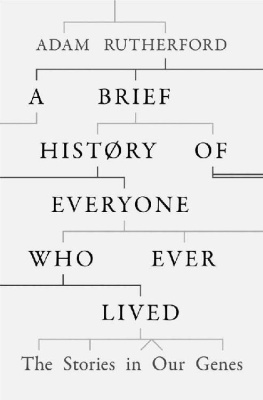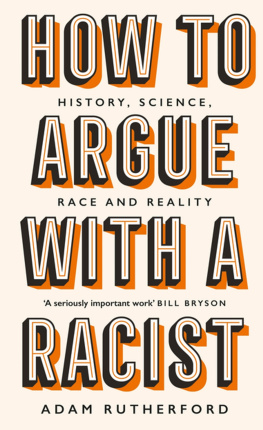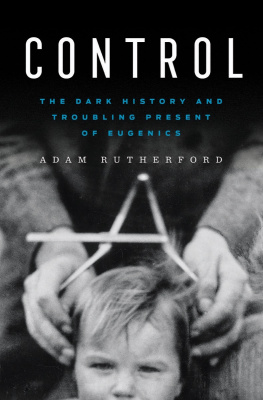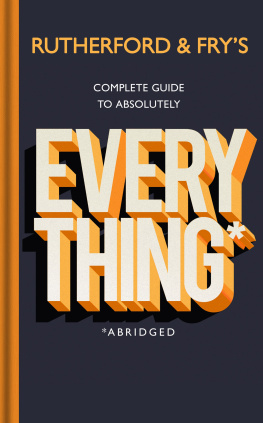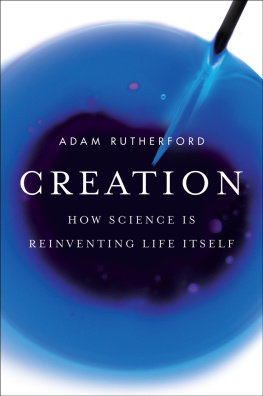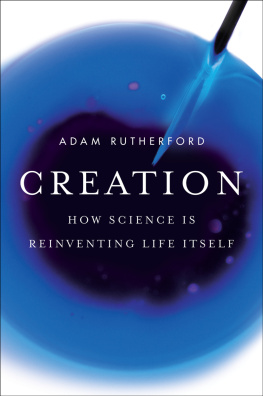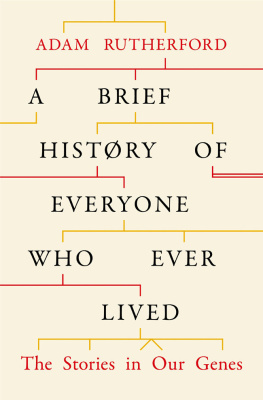A BRIEF HISTRY OF EVERYONE WHO EVER LIVED
The Stories in Our Genes
ADAM RUTHERFORD
Contents
Science demands collaboration. There are no lone geniuses, never evil geniuses, and very rarely any heretical geniuses. Almost all science is done by very normal people working in teams or in cahoots with others in similar or dissimilar fields, and they build knowledge on the shoulders of historical and contemporary giants, as Isaac Newton once suggested, parroting the words of the eleventh-century philosopher Bernard of Chartres, who was referencing the Greek myth of the temporarily blinded hunter Orion, who saw further by sitting a dwarf on his shoulders.
The science in this book is perhaps more collaborative than most, as it involves the introduction of a new discipline, genomics, into older ones, namely history, archaeology, palaeoanthropology, medicine and psychology. Author lists of genetics papers can now run into the dozens, hundreds and occasionally thousands. Long gone are the days when Victorian gentlemen could idle away their inheritances in hot pursuit of the fabric of nature.
Many people have helped me with the writing of this book, and I have used numerous research papers, which are listed at the back. For the most part though I have not included specific references in the text, nor individual researchers, simply to add to the flow of the stories herein. A large number of the studies involve Mark Thomas at University College London, and I am very grateful for his guidance and friendship over the years. The particular field , there is a glossary of some of the technical or less than friendly terms that geneticists use.
In the distant future I see open fields for far more important researches... Light will be thrown on the origin of man and his history.
Chapter 14: Recapitulation and Conclusion in
The Origin of Species by Charles Darwin, 1859
This is a story about you. It concerns the tale of who you are and how you came to be. It is your individual story, because the journey of life that alights at your existence is unique, as it is for every person who has ever drawn breath. And its also our collective story, because as an ambassador for the whole of our species, you are both typical and exceptional. Despite our differences, all humans are remarkably close relatives, and our family tree is pollarded, and tortuous, and not in the slightest bit like a tree. But we are the fruit thereof.
Something in the order of a 107 billion modern humans have existed, though this number depends on when exactly you start counting. All of them of us are close cousins, as our species has a single African origin. We dont quite have the language to describe what that really means. It doesnt, for example, mean a single couple, a hypothetical Adam and Eve. We think of families and pedigrees and genealogies and ancestry, and we try to think of the deep past in the same way. Who were my ancestors? You might have a simple, traditional family structure or, like me, it could be handsomely untidy, and its tendrils jumbled like old wires in a drawer. But no matter which, everyones past becomes muddled sooner or later.
We all have two parents, and they had two parents, and all of them had two parents, and so on. Keep going like this all the way back to the last time England was invaded, and youll see that doubling each generation results in more people than have ever lived, by many billions. The truth is that our pedigrees fold in on themselves, the branches loop back and become nets, and all of us who have ever lived have done so enmeshed in a web of ancestry. We only have to go back a few dozen centuries to see that most of the 7 billion of us alive today are descended from a tiny handful of people, the population of a village.
History is the stuff that we have recorded. For thousands of years, we have painted, carved, written and spoken the stories of our pasts and presents, in attempts to understand who we are and how we came to be. By consensus, history begins with writing. Before that we have prehistory the stuff that happened before we wrote it down. For the sake of perspective, life has existed on Earth for about 3.9 billion years. The species Homo sapiens, of which you are a member, emerged a mere 200,000 years ago in the east of Africa. Writing began about 6,000 years ago, in Mesopotamia, somewhere in what we now call the Middle East.
For comparison, the book you are holding is around 111,000 words, or 660,000 characters long, including spaces. If the length of time life has existed on Earth were represented as this book, each character, including spaces, is around 5,909 years. Anatomically modern humans tenure on Earth is equivalent to
... the precise length of this phrase.
The time we have been recording history is an evolutionary wing-flap equivalent to a single character, the width of this full stop<.>
And how sparse that history is! Documents vanish, dissolve, decompose. They are washed away by the weather, or consumed by insects and bacteria, or destroyed, hidden, obfuscated or revised. That is before we address the subjectivity of the historical record. We cant agree definitively on what happened in the last decade. Newspapers record stories with biases firmly in place. Cameras record images curated by people and only see what passes through the lens, frequently without context. Humans themselves are terribly unreliable witnesses to objective reality. We fumble.
The precise details of the events of 11 September 2001 when the World Trade Center towers were destroyed may well remain obscure because of conflicting reports and the chaos of those horrors. Witness testimonies in courts are notoriously defective and are always subject to squint-eye scrutiny. Flit back a few centuries, and there is no contemporary evidence even for the existence of Jesus Christ, arguably the most influential man in history. Most of our tales about his life were written in the decades after his death by people who never met him. Today, we would seriously question that, if it were presented as historical evidence. Even the accounts that Christians rely on, the Gospels, are inconsistent and have irreversibly mutated over time.
This is not to disparage the study of history (nor Christianity). Its merely a comment on how the past is foggy. Until recently it was recorded primarily in religious texts, business transaction documents and in the papers of royal lineages. In modern times we have the opposite problem far too much information and almost no way to curate it. In every purchase you make online, every internet search you do, you volunteer information about yourself to be captured by companies in the ether. Books, sagas, oral histories, inscriptions, archaeology, the internet, databases, film, radio, hard drives, tape. We piece together these bits and bytes of information to reconstruct the past. And now, biology has become part of that formidable swill of information.
The epigram at the beginning of this introduction is Darwins single reference to humans in The Origin of Species, right at the end, as if to tease us that there will be a sequel. With his proposed theory of descent with modification in the distant future, light will be shed on our own story: to be continued.
That time has come. There is now another way to read our pasts, and floodlights are being shone on our origins. You carry an epic poem in your cells. Its an incomparable, sprawling, unique, meandering saga. About a decade ago, fifty years after the discovery of the double helix, our ability to read DNA had improved to the degree that it was transformed into a historical source, a text to pore over. Our genomes, genes and DNA house a record of the journey that life on Earth has taken 4 billion years of error and trial that resulted in you. Your genome is the totality of your DNA, 3 billion letters of it, and due to the way it comes together by the mysterious (from a biological point of view) business of sex it is unique to you. Not only is this genetic fingerprint yours alone, its unlike any other of the 107 billion people who have ever lived. That applies even if you are an identical twin, whose genomes begin their existence indistinguishable, but inch away from each other moments after conception. In the words of Dr Seuss:
Next page
